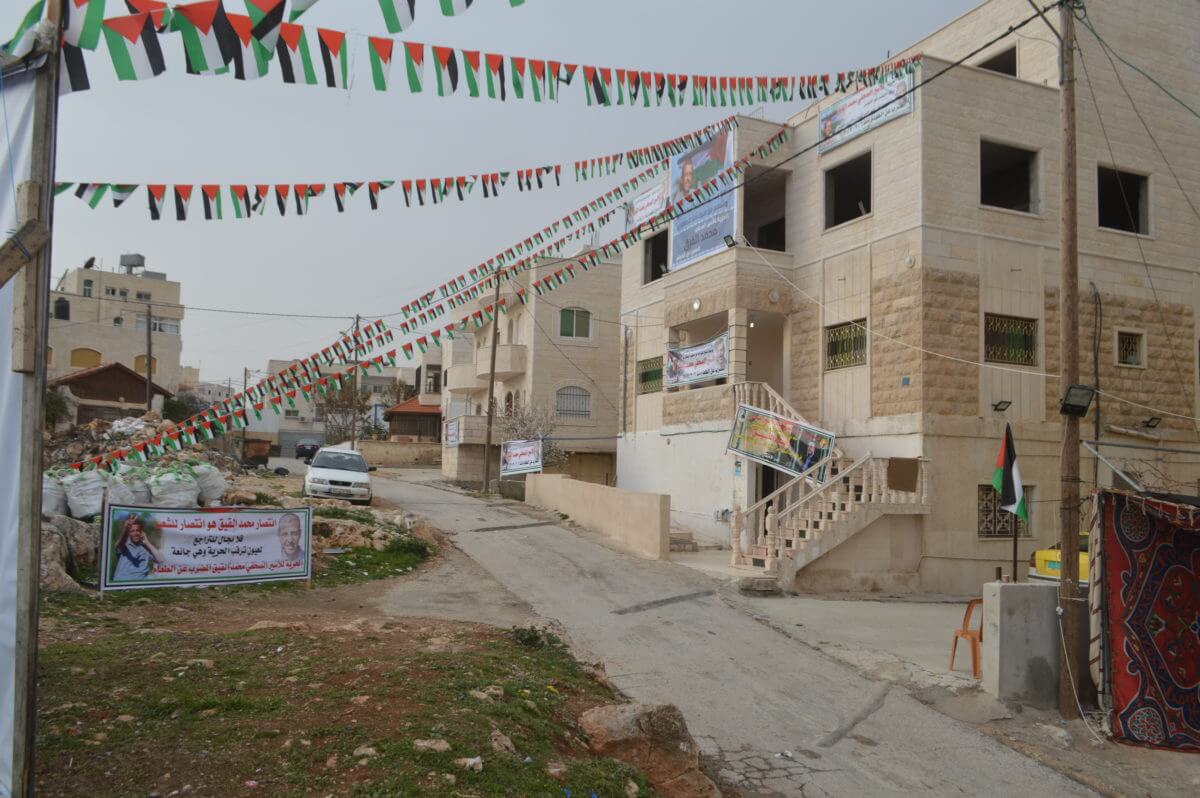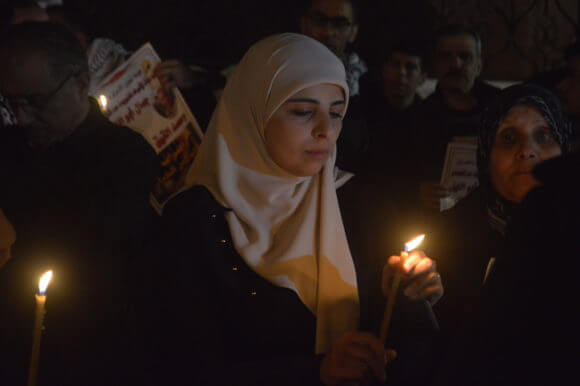On his second long-term hunger strike in the past year, Mohammed al-Qiq’s health is deteriorating faster than anyone expected, leaving his family to plea for support before it is too late.
Al-Qiq, a 34-year-old Palestinian journalist frequently detained by Israeli forces, was most recently arrested on Jan. 15 on his way home from a protest where demonstrators were peacefully demanding the return of several Palestinian bodies being held by Israeli authorities. Al-Qiq was transferred Assaf Harofeh Medical Center in Tel Aviv on Wednesday due to his deteriorating health.

“The minute Mohammed was arrested he announced he was going on hunger strike, but then the soldiers made him think they were levying actual charges against him, so he said he would not hunger strike,” Fayha Salash, Mohammed’s wife, explained. “It wasn’t until he had his first hearing that he realized it was a trick, and he was being held again without charges, that he said he was really going on hunger strike again.”
On Feb. 6, weeks after al-Qiq’s first hearing, Israeli forces officially put al-Qiq in administrative detention—an Israeli policy that allows Palestinians to be held without charge or trial, indefinitely.
Amnesty international called the ruling “unjust and cruel.”
“[The] decision to approve the administrative detention of Mohammed al-Qiq is an affront to justice. Israel’s administrative detention which is predominately used to detain Palestinians without charge or trial is arbitrary and abusive. The Israeli authorities must end this practice, which itself can amount to cruel and inhuman treatment, once and for all,” said Magdalena Mughrabi, Deputy Director for the Middle East and North Africa program at Amnesty International.
On Tuesday, al-Qiq entered his 28th day of strike.
Al-Qiq’s current administrative detention sentence is for three months, though the family has no way to know whether he will be released on May 6, or if the order will be renewed. Regardless, al-Qiq has committed to staying on hunger strike until he is released by Israeli forces or has charges officially levied against him.
Amnesty’s Mughrabi also called for his release or charge.
“Instead of prolonging Muhammad al-Qiq’s suffering in detention the Israeli authorities should either charge him with a legitimate criminal offense or release him. In the meantime he must be transferred to a civilian hospital to receive the specialized treatment he requires,” Mughrabi said.
Meanwhile, al-Qiq’s wife said her husband has no choice but to continue the strike, or risk losing everything he fought for previously.
“If Mohammed were to quit his hunger strike now, the first one that almost killed him would be for nothing, so he feels he must continue his strike—not just for himself, but for all the other Palestinian prisoners on strike against their administrative detention as well — they must stay strong together,” he wife told Mondoweiss.

Family calls for support
During al-Qiq’s last hunger strike, which lasted 94 days, al-Qiq was at the center of pro-Palestinian prisoner activism, but this time, as the journalist enters the end of his first month on hunger strike, al-Qiq’s family said they wish he was receiving the same kind of attention he had garnered last year, which they feel translates into pressure on the Israeli government and society.
“The problem that all hunger strikers are having now, not just Mohammed, is that the average hunger strikes are getting longer and longer before Israel makes a deal with the prisoners, so someone on their 24th day of hunger strike is no longer such a big deal, and people don’t support them the way they would have before, since we are now seeing hunger strikes that go on so much longer,” Salash said.
In 2016, al-Qiq was one of several Palestinian prisoners to take on extended hunger strikes, including Bilal al-Kayed, who was on hunger strike for 71 days, and two brothers from the Balbould family, Mohammed and Mahmoud, who both went on strike for nearly 80 days.
Because al-Qiq had ended his 94-day strike just eight months before he started the most recent one, his health has deteriorated much faster than expected. On his 14th day of strike, al-Qiq’s lawyer, Khalid Zabarqa told reporters that al-Qiq was suffering from back pain, dizziness and could barely walk.
Today, al-Qiq has lost all ability to walk and is having serious problems with his vision, has nearly lost the ability to speak, and is coughing up blood.
Since the start of his detention, al-Qiq has only been allowed a visit from his lawyer once a week, and his family has not been allowed to visit at all.
His family has faith that al-Qiq will be able to hold on and continue the commitment to his strike, but whether his body can handle three more months of not eating is hard to say.
“It’s scarier this time, because of the way his body has deteriorated so quickly,” his wife told Mondoweiss.
Al-Qiq will certainly suffer the physical effects of both hunger strikes long after he is released.
“Mohammed was having very bad health problems since he was released last year, we tried to go to Jordan to see a specialist, but Israel refused to give him permission to leave the West Bank.” Salash explained. “We just pray that he will be okay after this hunger strike and that this is the last one.”

Al-Qiq’s father, Ahmad al-Qiq, 68, a lawyer, told Mondoweiss that his son was always a headstrong and determined child.
“As a kid Mohammed was always kind, he was always helping people, always so respectful of others, but he was also a stubborn kid and when his mind stuck to something he didn’t give up on it,” his father told Mondoweiss. “All his life he’s always been so good, he volunteers, he helps his community always, he was the first in his class in university and head of the student council.”
“His character is why he is able to commit to the strike the way he is,” his father said. “He’s a man of principles, and he can’t just leave it, he’s a very religious guy and he gets a lot of strength from that,” he continued.
Al-Qiq’s father said that while he is worried about his son, most of his concern lies with Mohammed’s children, five-year old Islam and two-and-a-half-year old Lour. Islam, now old enough to understand what is going on with their father, unlike last year, constantly asks for his dad.
“Of course I am worried about Mohammed, but I am more worried for the kids because they are asking me everyday, ‘where is dad, where is my father,’ and they shouldn’t have to deal with that” Ahmad said. “They say they want their dad to come home and have dinner with them because they know he is not eating with the soldiers, and that is making him sick.”
While waiting for news about Mohammed, the al-Qiq family have made garnering support their main concern. Every week Mohammed’s wife and brother travel to cities in the occupied West Bank hoping to spark more solidarity for Mohammed.
“There is support for Mohammed in Palestine, but we need more,” Salash told Mondoweiss. “We desperately need people to stand up for Mohammed and demand his release. Yes it is hard for us that Mohammed is in prison and that he is doing another strike, but this is his fight and what he needs from us is support, I’m not sure he could continue without knowing that we are all behind him and fighting for him.”



Why won’t more Palestinians support his strike? Afraid of administrative detention themselves?